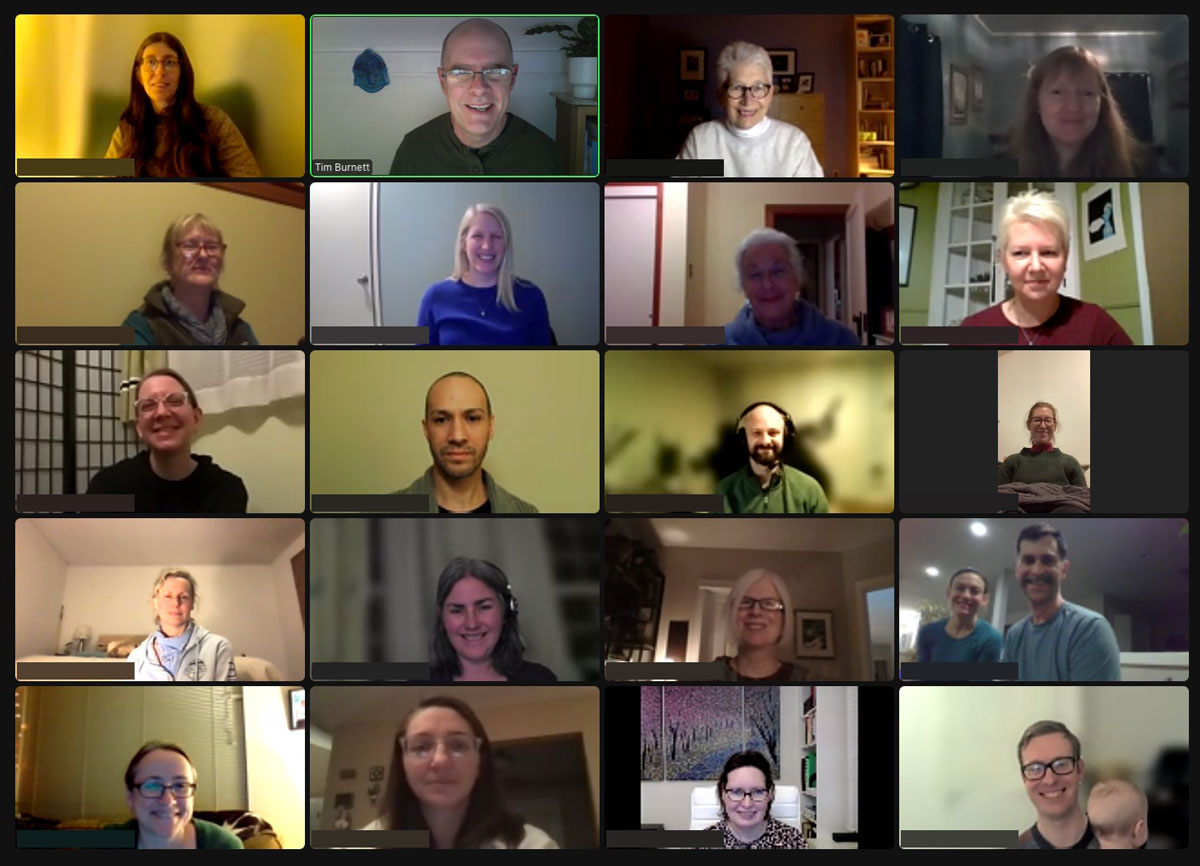MIndfulness-Based Stress Reduction
Explore our mindfulness and compassion programs
Search | Drop-In | Living | MBSR | MSC | Healthcare | Retreats | Continuing Education | Teacher Training | Going Deeper | Printable Schedule
Mindfulness-Based Stress Reduction (MBSR)

Steady in the Storm: An Evening of Mindfulness

Mindfulness-Based Stress Reduction

Mindfulness-Based Stress Reduction
MIndfulness-Based Stress Reduction: the gold standard course for learning mindfulness! Learn to be more present in your life and more resilient under stress.
Mindfulness-Based Stress Reduction is available every quarter as an 8-week course online and in person. Or try one of our Introduction to Mindfulness classes to learn more.
This hands-on, evidence-based course was developed by Jon Kabat-Zinn at the University of Massachusetts Medical School in 1979.
Continuing Education: MBSR attendance qualifies you for up to 27 APA CE credits (psychologists, MFTs, LPCCs, LEPs, and LCSWs) or up to 32 BRN credits (nurses). Sign up for continuing education during class registration (additional fee).
Want to learn more about this style of mindfulness before taking the plunge? Check out our Free Drop-In and Introductory Programs.
Curious about what it’s like to take the 8-week MBSR class? Consider watching this five-minute message from Senior Teacher Tim Burnett.
You Are Welcome Here
Everyone is welcome at Mindfulness Northwest, regardless of race, religion, age, ability, gender expression, who you love, what you believe -- everyone. We at Mindfulness NW work hard to make our spaces safe for all, and we thank you for joining us with that same intention.
Not only did I learn mindfulness practices and techniques that I could use for my own benefit, but I was able to share what I learned with my clients during counseling sessions. An added benefit was the camaraderie and community spirit that was experienced amongst fellow mindfulness students, even within a virtual classroom environment.
More About Mindfulness-Based Stress Reduction (MBSR)
Developed in 1979, Mindfulness-Based Stress Reduction (MBSR) is an 8-week course on mindfulness practice developed by Jon Kabat-Zinn at the University of Massachusetts Medical School.
Since then over 25,000 people have taken MBSR. It is considered the gold standard in mindfulness training: there are several other mindfulness-based classes and interventions, but MBSR is the oldest and most studied for improvements in health and well-being.
This interactive course helps you draw on your own inner resources to actively engage in caring for yourself. This can lead to finding greater balance, ease, and peace of mind.
RESEARCH EVIDENCE SUGGESTS MBSR IS HELPFUL FOR:
- immune system function
- reducing anxiety
- preventing relapse of depression
- reducing negative emotions
- responding to stress
- managing chronic pain
- enhancing compassion and altruism
- professionals: coping with stress, connecting with patients, and reducing burnout-inducing negative emotions and anxiety
- veterans and other sufferers of PTSD
- general health and well-being
OUR 8-WEEK MBSR COURSE
In a safe, supportive atmosphere, you’ll work with your classmates and instructor to:
- Explore mindfulness practices including sitting and walking meditation, mindful movement, body awareness, and others.
- Learn mindful approaches to manage pain, stress, and difficulty in an effective way.
- Connect with the wisdom of your own body and learn to relax tension.
- Develop tools to work with and transform stressful situations and reactions.
- Discover how to address depression and anxiety more skillfully.
- Gain more control over your own health and well-being, feeling empowered to live with more joy and equanimity.
THE COMMITMENT OF MBSR
MBSR is experiential education. By spending a significant amount of time in class and at home, it’s possible to change patterns of reactivity and stress, transforming relationships and attitudes of all kinds.
For this “magic” to work, participants must be committed to putting in the time to practice and study. This includes:
- Eight classes, each typically two-and-a-half hours long.
- One day-long retreat (typically six or seven hours long).
- 30-45 minutes of daily practice at home during the entire course. (Many participants choose to continue after the course ends!)
To receive benefit from MBSR you must be ready to make your best effort to attend all class sessions and do the home practice. There is plenty of support from the instructor, the recorded and written materials, and from your fellow participants, but the decision to commit to MBSR can come from you alone.
Thousands of people from all walks of life have benefited from the Mindfulness-Based Stress Reduction (MBSR) program – and you can too! This program is suitable for anyone who is interested in living a less stressful and more rewarding life.
Before registering for MBSR, consider watching this 5-minute video from Executive Director Tim Burnett.
What are your classes like?
Our teachers work hard to create a supportive, friendly, and safe classroom community for you and the other participants in our multi-week classes. Mindfulness and compassion training can be many things to many people at different points in their lives: supportive, exploratory, revealing, and at times challenging. The classes include both tools you can use every day and opportunities to take a deep dive into your mind, habits, and conditioning. This process has many benefits but it’s also important to consider if the time is right. Please read on and consider watching the 5-minute video below.
There are instances where a longer course like Mindfulness-Based Stress Reduction or Mindful Self-Compassion can be less helpful or even harmful. If you've recently experienced serious psychological challenges like schizophrenia or psychosis not responsive to medication, or you are experiencing severe depression with thoughts of suicide, class is probably not helpful at this time. We also suggest caution if you're recently in recovery, recently lost a close loved one, have Post-Traumatic Stress Disorder (PTSD), or have recently experienced significant trauma.
If you're unsure about registering for a course, please contact the Mindfulness Northwest office. We want to be sure there is sufficient support for you and that the timing is right for taking our courses.
WHO TAKES OUR CLASSES?
All adults (18+) are welcome! Our supportive, inclusive community celebrates participants from all backgrounds. Everyone is welcome at Mindfulness Northwest, regardless of race, religion, age, ability, gender expression, who you love, what you believe -- everyone. We at Mindfulness NW work hard to make our spaces safe for all, and we thank you for joining us with that same intention.
Certain retreats are best suited for more experienced practitioners; details about prerequisites are included with each event description.
Couples and close friends do often take our classes together. We ask that people who are attending our programs together please register separately.
LEARNING MORE
We hope you enjoy this five-minute message from Executive Director Tim Burnett on what our classes look and feel like. We recommend you watch it before enrolling in an 8-week or residential MBSR or MSC.
Class and Retreat Day Make Ups
MISSING A SESSION FROM A MULTI-WEEK CLASS?
If you missed a session from a multi-week class you may be able to make it up by attending another class if we have one available during the current calendar quarter. We cannot offer a make up session in a subsequent quarter's class or maintain a credit towards the future.
Contact us to see if a make up of the missed session can be made up in another class providing the name of your current class, teacher's name, location, day of the week, and the session you’ll be missing (e.g. "Class 6 of Beth's Tuesday evening MBSR Online").
CAN'T MAKE THE CLASS RETREAT DAY?
If you're signed up (or considering signing up) for one of our multi-week classes that includes a retreat day and can't make that day, you are welcome to transfer to a similar retreat day during that same calendar quarter. Check out the One Day Retreats listing and contact us to ask about switching days providing the name of your current class, teacher's name, location, day of the week, and the desired new retreat day (e.g. "I'm in Class 6 of Beth's Tuesday evening MBSR Online and I'd like to do the retreat day on February 22nd.").
Preparing for Mindfulness-Based Stress Reduction
We recommend watching this five-minute message from Executive Director Tim Burnett on what our classes look and feel like before enrolling in an 8-week or residential MBSR or MSC.
If you’re unsure about registering for a course, please contact the Mindfulness Northwest office. We want to be sure there is sufficient support for you and that the timing is right for taking our courses.
A Documentary on MBSR
Healing and the Mind – Healing from Within – the classic 1993 PBS documentary with Bill Moyers on Jon Kabat-Zinn and MBSR. Well worth spending 46 minutes on.
MBSR was featured on PBS in Bill Moyers’ documentary Healing and the Mind in 1993 which was seen by more than 40 million people; on NBC’s Dateline; on ABC’s Evening News and Chronicle programs; on The Oprah Winfrey Show; and in hundreds of newspaper and magazine articles.
More on Continuing Education
Continuing Education Credit is available for many professions:
- In most of our 8-week MIndfulness-Based Stress Reduction (MBSR) and Mindful Self-Compassion (MSC) courses, APA CE's & BRN's are available for psychologists, nurses, MFTs, LPCCs, LEPs, and LCSWs. Note that requests for continuing ed after a course has begun incur a $50 late fee.
- in our 5-week Mindfulness for Healthcare Professionals (MHP) course, CME credit is available for physicians, nurses, and other healthcare professionals.
Regarding partial attendance:
- For APA CE's (MBSR & MSC), complete attendance of the course is required. We can sometimes offer make-up classes in a parallel course, but this is not always available. If you know you will miss a session, we recommend that you wait to register for a series when you can plan to attend all sessions.
- For CME's, the attendance requirement is more flexible: credit can be pro-rated to the number of hours you attend.
Scroll to CE details for MHP | MBSR | MSC
5-week Mindfulness for Healthcare Providers (MHP) Course
Physicians, nurses, therapists, and social workers: PeaceHealth St. Joseph designates this live activity for a maximum of 16.25 AMA PRA Category 1 Credits™. It meets the criteria for Category I CME credit to satisfy the relicensure requirements of the Washington State Medical Quality Assurance Commission.
Learning Objectives for the 5-week Mindfulness for Healthcare Providers Course. After this education, learners should be able to:
- Choose appropriate mindfulness training techniques in preventive and responsive ways in high-stress situations.
- Utilize appropriate mindfulness practices to mitigate the risk factors for burnout.
- Discuss strategies with peers for a more positive, mindful engagement in work and home situations that have previously triggered stress response and unhelpful behaviors.
- Identify helpful vs. unhelpful thought patterns, problem solving, emotional regulation, and meaning-focused coping strategies.
- Demonstrate meaningful change in personal mindfulness, perceived stress, and burnout as shown in standardized measures administered pre- and post-activity.
8-week Mindfulness-Based Stress Reduction (MBSR) Course
Psychologists: Up to 27.0 CE Continuing Education Credits for this program are provided by UC San Diego Center for Mindfulness. The UC San Diego Center for Mindfulness is approved by the American Psychological Association to sponsor continuing education for psychologists. The UC San Diego Center for Mindfulness maintains responsibility for this program and its content.
Licensed MFTs, LPCCs, LEPs, LCSWs: Up to 27.0 Continuing Education Credits for this program are provided by UC San Diego Center for Mindfulness. The UC San Diego Center for Mindfulness is approved by the American Psychological Association to sponsor continuing education for psychologists. 27.0 CE credit may be applied to your license renewal through the California Board of Behavioral Sciences.
Nurses: UC San Diego Center for Mindfulness is approved by the California Board of Registered Nursing, Provider Number CEP16351, for 32.0 contact hours.
UCSD CE Learning Objectives for the 8 week Mindfulness-Based Stress Reduction (MBSR) course:
- Articulate the key aspects of mindfulness as it relates to stress reduction, coping with pain and illness and enhancing well-being
- Differentiate MBSR from relaxation and other distraction techniques that may seem similar but are fundamentally and theoretically quite different in contending with difficulty and enhancing quality of life
- Apply mindfulness techniques in both personal and professional settings as a means of contending more effectively with the demands of both settings
- Integrate mindfulness into social interaction with patients, colleagues, supervisors, family and friends to facilitate more effective and mindful communication
- Articulate the potential benefits of mindfulness-based stress reduction (and mindfulness in general) to educate patients and their families about the benefits of such programs in their own lives
- Implement brief mindfulness practices with patients and family members as a means of contending with acute pain, anxiety and distress.
CE Registrants are responsible for completing all requirements for attendance or making up missed classes, as well as completing the post class evaluation by no later than 3 days after the last class meeting. Failure to do so will result in forfeiture of CE’s.
8-week Mindful Self-Compassion (MSC) Course
Psychologists: Up to 24.0 Continuing Education Credits for this program are provided by UC San Diego Center for Mindfulness. The UC San Diego Center for Mindfulness is approved by the American Psychological Association to sponsor continuing education for psychologists. The UC San Diego Center for Mindfulness maintains responsibility for this program and its content.
Licensed MFTs, LPCCs, LEPs, LCSWs: Up to 24.0 Continuing Education Credits for this program are provided by UC San Diego Center for Mindfulness. The UC San Diego Center for Mindfulness is approved by the American Psychological Association to sponsor continuing education for psychologists. Credits may be applied to your license renewal through the California Board of Behavioral Sciences.
Nurses: UC San Diego Center for Mindfulness is approved by the California Board of Registered Nursing, Provider Number CEP16351, for 28.75 contact hours.
UCSD CE Learning Objectives for the 8-week Mindful Self-Compassion (MSC) class:
- Describe the theory and research supporting mindful self-compassion
- Develop and apply self-compassion practices to motivate themselves with encouragement rather than self-criticism
- Assess and manage difficult situations and emotions with greater moment-to-moment acceptance
- Develop and apply self-compassion practices to respond to feelings of failure or inadequacy with self-kindness
- Transform difficult relationships, old and new, through self-validation
- Utilize the art of savoring and self-appreciation to overcome negative attention bias
- Apply core mindfulness and self-compassion practices into daily life
- Demonstrate simple self-compassion practices to patients, students, or clients
CE Registrants are responsible for completing all requirements for attendance or making up missed classes, as well as completing the post class evaluation by no later than 3 days after the last class meeting. Failure to do so will result in forfeiture of CE’s.



